News
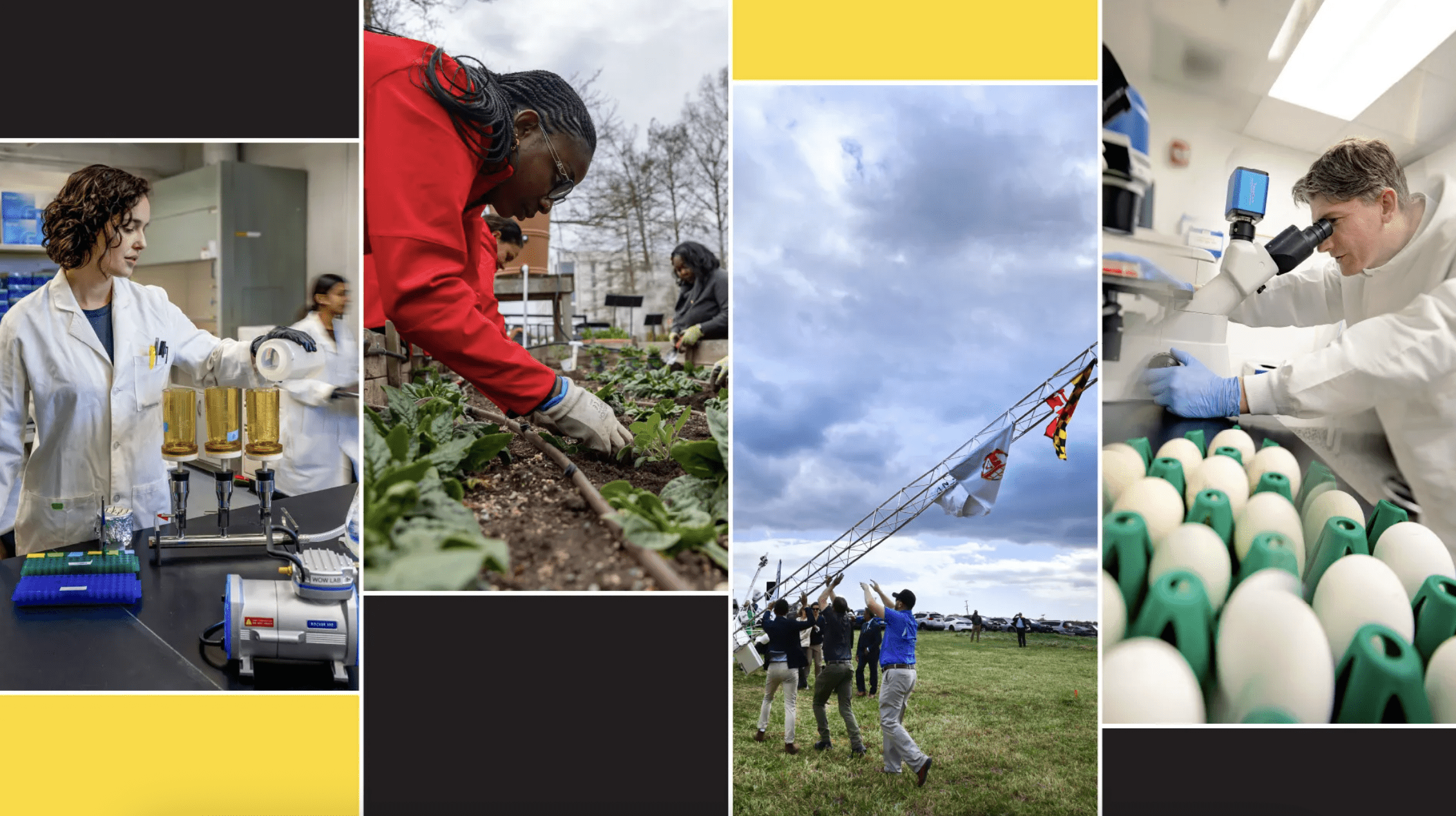
The Maryland Democracy Initiative (MDI), launched through the University of Maryland’s Grand Challenges Grants Program, continues to strengthen civic participation and democratic engagement across the state. The Grand Challenges program, which invested $30 million in research addressing major societal issues, has generated $55 million in external funding and supported projects that benefit communities throughout all 24 Maryland counties.
As part of this effort, the Maryland Democracy Initiative plays a central role in preparing Marylanders for lifelong civic participation. The initiative has developed voter guides, supported voter registration drives, and trained individuals to effectively advocate for public policy and present testimony before policymakers. In addition, MDI has created K–12 civic education materials and professional development programs that help students and educators build critical civic literacy skills, including evaluating credible information and engaging in informed discussions about public issues.
Learn more on Maryland Today.
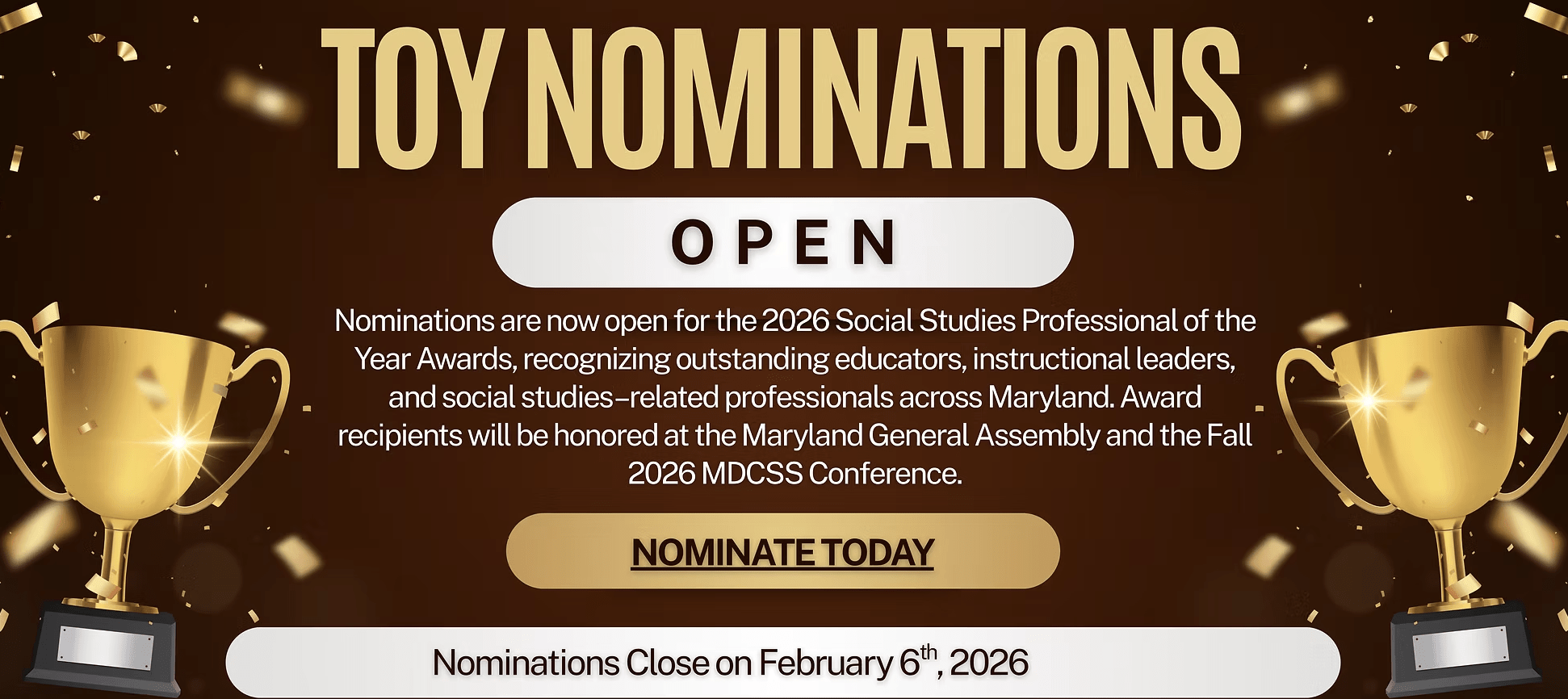
Know a phenomenal elementary or secondary teacher, instructional leader or professional in the social students field? Nominate them for the MDCSS Annual Social Studies Professional of the Year Award
DEADLINE: Friday, February 6th 2026
- Nominations are reviewed and voted on by the MDCSS Board.
- Professionals selected for these awards will be honored at the Maryland General Assembly and Fall 2026 MDCSS Conference.
- Elementary or secondary social studies teachers that have made significant contributions to teaching for civic engagement are eligible for the MD Civic Education Coalition Civic Leader of the Year award.
Nominate your favorite Social Studies Educator Today! For more information and to nominate visit https://www.mdcss.org/awards
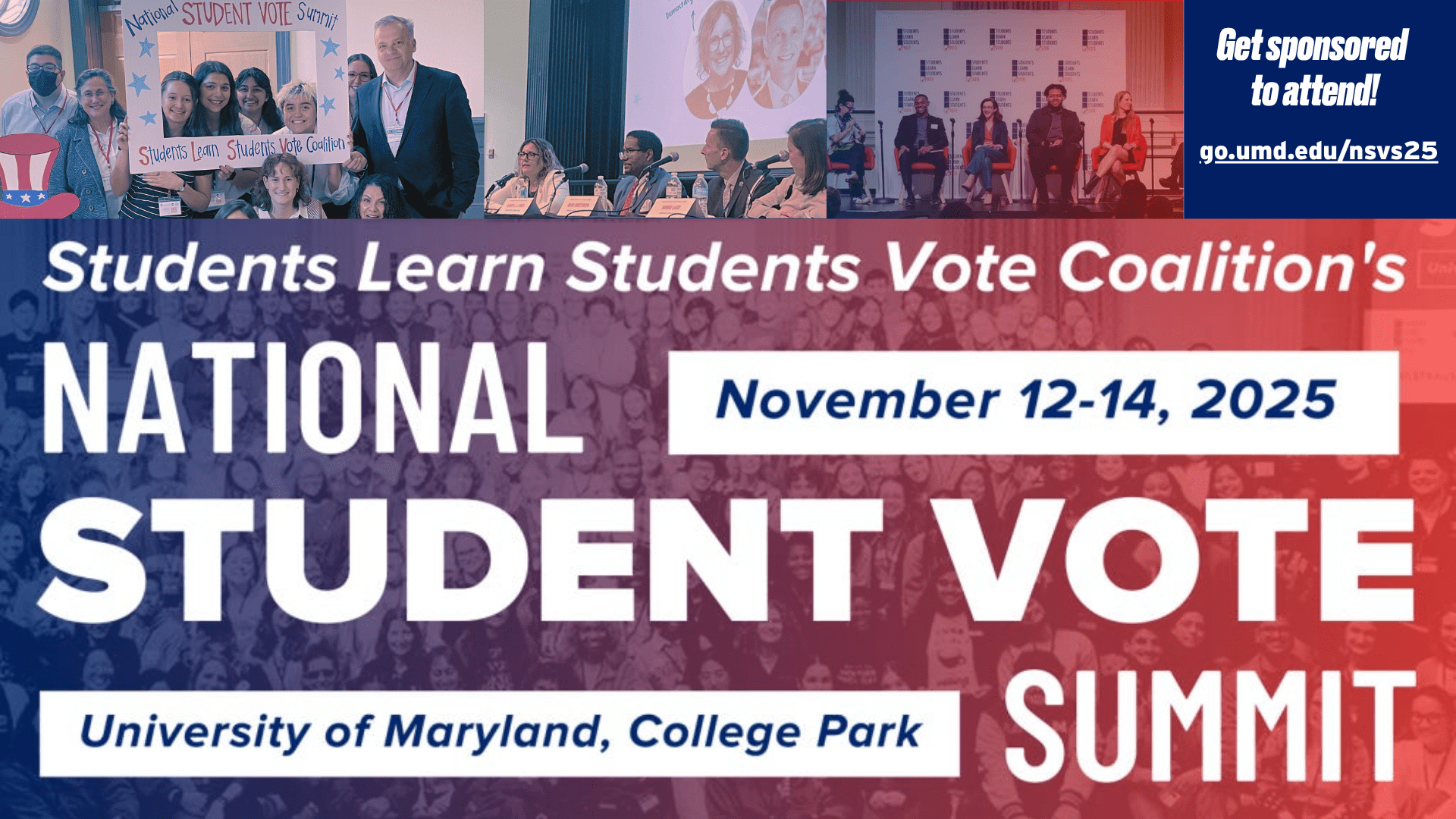
On November 12-14, the nonpartisan nonprofit Students Learn Students Vote (SLSV) Coalition held its 10th annual National Student Vote Summit at the University of Maryland. The summit brought together 325 participants, including 184 college students representing institutions from 36 U.S. states and Washington, D.C.
UMD’s Maryland Democracy Initiative (MDI) and TerpsVote served as event co-sponsors of the summit. In addition, MDI sponsored 23 UMD students in attending the summit, giving UMD students the opportunity to network with peers from across the country, connect with national leaders in civic engagement and participate in hands-on workshops designed to strengthen their organization and leadership skills.The partnerships with TerpsVote and SLSV reinforce MDI’s mission to expand nonpartisan student voter engagement, build a more informed and active electorate and develop the next generation of civic leaders.
Speakers at the summit included SLSV Coalition Co-Founder and Executive Director Clarissa Unger, CIRCLE Newhouse Director Leela Strong, Delta College President Michael H. Gavin, Montgomery College President Jermaine F. Williams, ALL-In Campus Democracy Challenge Executive Director Jennifer Domagal-Goldman who is a Maryland Democracy Initiative key partner, and student vote leaders. Programming included dozens of roundtables, panels and interactive workshops, as well as an interactive goal-setting session for 2026 and a celebration of the 10th anniversary of the SLSV Coalition.
“The summit was a celebration of so much of what we stand for as a coalition,” said Unger. “We strengthened not only the nonpartisan student vote movement but also the connections that bring us together and will help guide this work in 2026 and beyond.”
“The National Student Vote Summit clearly aligns with the Maryland Democracy Initiative’s mission to strengthen our shared democracy through meaningful collaborations with local, state, and national partners, effective teaching and learning for civic literacy, and research-based interventions and innovative responses to new and evolving threats to democracy. I especially appreciate the summit’s focus on how to inspire and empower students to be civically engaged between elections. We appreciate our partnerships with TerpsVote, SLSV, and all the nonprofits and campuses across the country who are giving students a voice in our democracy!”, said Lena Morreale Scott, the lead principal investigator of the Maryland Democracy Initiative.
Linh Ngo, an undergraduate student at the University of Maryland studying economics and a student intern with the Maryland Democracy Initiative, attended sessions. She found “Do We Live in a Democracy?” to be the most insightful:
“So many fundamental questions were raised, such as: What are the key elements of a democracy? Will we have free and fair elections in 2026 and beyond? It was inspiring to be involved with this coalition because hearing from different schools, fellow students, and researchers showed me that coalitions make sure efforts aren’t duplicated or siloed. Instead, they become aligned and mutually reinforcing across campuses, states, and communities.
“It was incredibly valuable to hear so many perspectives on how to best organize and mobilize students, and I definitely see the power of being part of a coalition. The panels covered all facets of voting—from whether we truly live in a democracy, to the importance of meeting basic student needs. From an organizing standpoint, the strategies shared to mobilize students were especially inspirational. Overall, the Summit energized me both as a student and as a voter.”
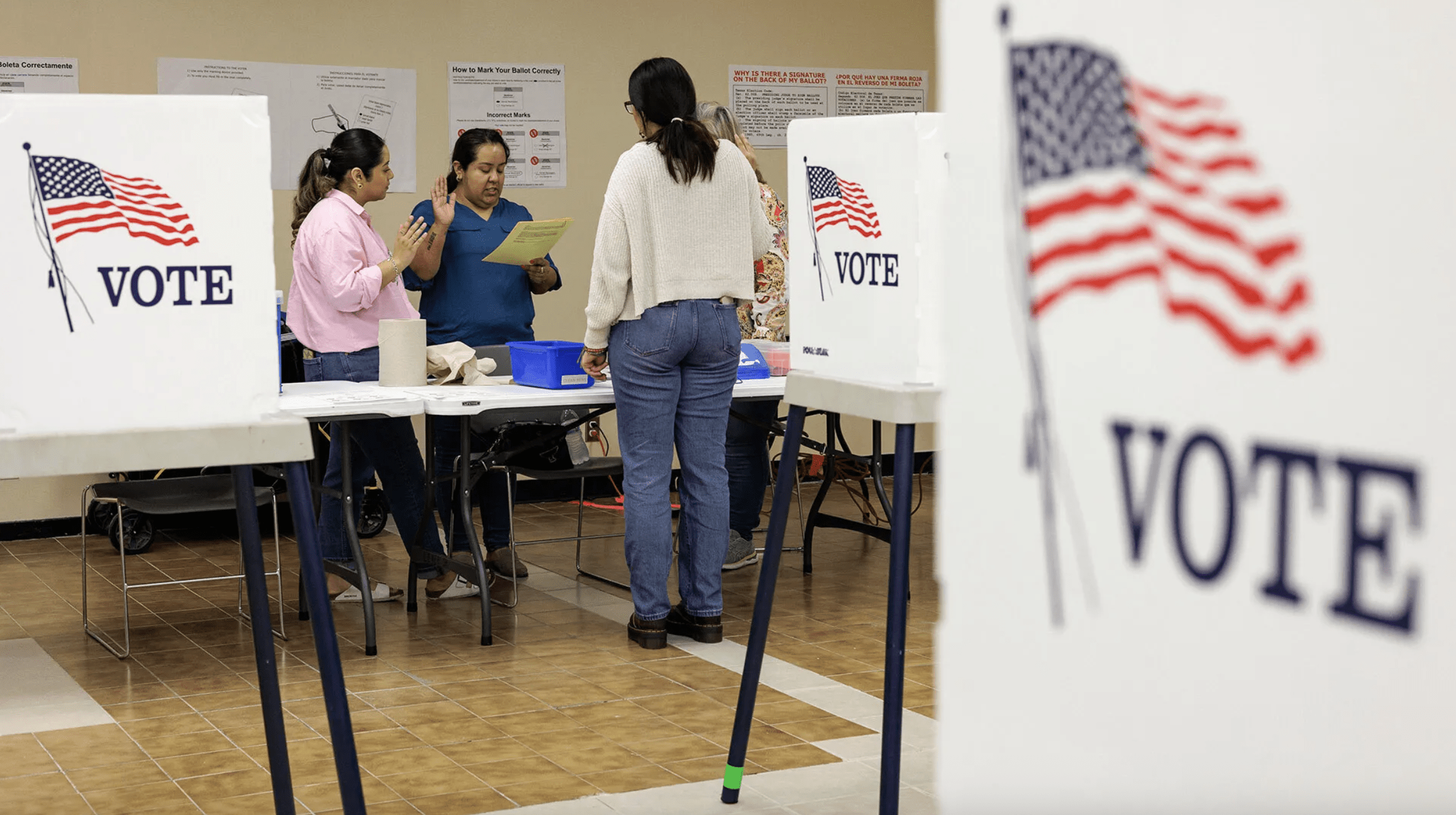
October 07, 2025
A new University of Maryland lab will work to boost the capacity of election offices to administer these contests crucial to our democracy, thanks to a four-year, $2.3 million grant from the Election Trust Initiative (ETI), a nonprofit that develops and supports strategies to strengthen America’s election administration systems.
The Election Resilience Lab will be part of the Center for Democracy and Civic Engagement (CDCE) in the College of Behavioral and Social Sciences (BSOS).
“Our college’s motto is to ‘be the solution to the world’s great challenges,’ and time and again, the Center for Democracy and Civic Engagement has answered that call,” said BSOS Dean Susan M. Rivera. “Every time that elements of our democracy have been called into question, CDCE has been there providing answers, or seeking to find them. The Election Resilience Lab will expand CDCE’s ability to effectively navigate these scenarios, and therefore make an even greater difference for the American public.”
The ETI grant will specifically support CDCE in creating actionable, empirical evidence for those who run elections, and for those who determine election policy; it will also work with election officials to ensure academic research focuses on their immediate needs. ETI is supported by the Klarman Family Foundation, the Peter G. Peterson Foundation, the Pew Charitable Trusts, and the William and Flora Hewlett Foundation.
The lab will emphasize election workforce issues, including identifying and addressing the root causes of burnout and turnover in election administration, including poll workers and government officials. It will also support CDCE’s collaboration with a broader network of academic centers studying election science, including the new Center for Trusted and Transparent Elections at the University of California San Diego, which is being launched with a similar grant from ETI this fall.
“A resilient elections workforce is key to ensuring secure and trusted elections in America,” said Ashley Quarcoo, executive director of the Election Trust Initiative. “Election officials are experiencing increased demands, so we’re proud to support the Election Resilience Lab in bringing together researchers and practitioners to tackle these challenges. Their efforts will undoubtedly help strengthen U.S. elections.”
With partners in the Maryland Democracy Initiative, the Election Resilience Lab will also explore collaborations within the University of Maryland, such as the College of Education, Philip Merrill College of Journalism and School of Public Policy.
“Research universities have an obligation to engage deeply with community partners, learn from their lived experiences, co-create new knowledge, and turn insight into impact,” said CDCE Director Michael Hanmer. “This grant empowers our incredible team to fortify the elections workforce and rebuild trust in our electoral system—at a moment when both are urgently needed.”
Alysoun McLaughlin, a widely recognized election administration expert with 25 years of election management and policy experience, will lead the lab’s efforts. McLaughlin served as a nonpartisan local election official in Montgomery County, Md., for more than a decade. She also held management and election policy roles at the District of Columbia Board of Elections, the Pew Center on the States, the National Association of Counties and the National Conference of State Legislatures.
“It has been a tremendous privilege to work with the Center for Democracy and Civic Engagement in shaping our vision for an applied research lab,” said McLaughlin. “I am impressed with the dedication across the entire University of Maryland community to supporting the people and processes of our democracy, and am honored to be appointed to the faculty and to serve as director of the new Election Resilience Lab. I look forward to leading research partnerships with election officials, in Maryland and across the country, to build a stronger evidence base to support data-driven decision making in election administration.”
Source: MarylandToday

On November 20-22, the University of Maryland’s College Park campus hosted the Students Learn Students Vote (SLSV) Coalition’s 2024 National Student Vote Summit, a three-day event dedicated to enhancing nonpartisan student voter engagement. Sponsored by the Maryland Democracy Initiative (MDI) alongside other organizations, including TerpsVote, UMD, VoteRiders and more, the annual summit brought together over 300 participants from across the nation, including 200 college students representing 35 states and Washington, D.C.
"We are proud to partner with TerpsVote and the SLSV Coalition to convene such a dedicated and diverse group of students, scholars and practitioners committed to increasing nonpartisan college student voter engagement. The National Student Vote Summit is an incredible opportunity to energize our efforts and share innovative strategies and high-impact practices to help college students make their voices heard in our shared democracy." Lena Morreale Scott, principal investigator (PI) for the Maryland Democracy Initiative.
The Maryland Democracy Initiative (MDI) is a nonpartisan, interdisciplinary program that combines expertise from the College of Education, College of Behavioral and Social Sciences, Philip Merrill College of Journalism, and the School of Public Policy at the University of Maryland. MDI focuses on improving voting access, educating students about their rights and eliminating barriers to voter participation. Through advocacy and outreach across Maryland, MDI ensures students can navigate the voting process with confidence and ease, aligning perfectly with the summit’s goals.
Twenty-one students from UMD, sponsored by MDI, participated in the event, which featured a range of panels, workshops and discussions aimed at equipping student leaders with tools to drive civic engagement on their campuses.
The summit featured a Democracy Heroes panel moderated by Maryland Secretary of Service and Civic Innovation D. Paul Monteiro Jr. Panelists included SLSV Coalition Co-Founder Clarissa Unger, Howard University Organizer David Ledbetter and VoteRiders CEO and Executive Director Lauren Kunis. They shared personal experiences and strategies to empower young leaders in sustaining civic engagement on campuses nationwide.
Mason Hill ’25, a VoteRiders intern and a government and politics major and sustainability studies minor at UMD, emphasized the importance of grassroots advocacy, stating, “One of my goals is to have the courage to bring civic engagement up in casual conversation, even with people I would usually be wary of talking politics with.”
A key discussion at the summit addressed the challenge of student apathy in voting. Despite increased efforts in voter engagement, student turnout in 2024 did not surpass previous records. Attendees explored strategies to combat this trend, focusing on education and sustained engagement to motivate students to participate in the democratic process.
The event concluded with the 2024 SLSV Awards, recognizing 12 coalition partners for their outstanding contributions to the StudentVote movement. The ceremony celebrated excellence in collaboration, equity and innovation, inspiring attendees to continue driving progress in their communities.
Reflecting on the summit’s impact, Unger stated, “The 2024 National Student Vote Summit showcased a national movement’s strength, as well as its community. The hundreds of participants who came together not only learned, shared and connected, but also laid the groundwork for the future of nonpartisan student voter engagement in 2025 and beyond.”
UMD’s delegation left the summit inspired to advance their mission of fostering a culture of civic engagement and making voting accessible for all students. Anna Moitoza ’26, a public policy major, shared her inspiration from “being with so many people from all walks of life who, together, cared about civic engagement and advocacy for voting.” She emphasized that the summit reminded her of the importance of continuing the conversation about civic engagement, even beyond election years. Looking ahead, she plans to deepen her involvement by further educating herself about civic engagement and volunteering as a poll worker in the next Maryland election.
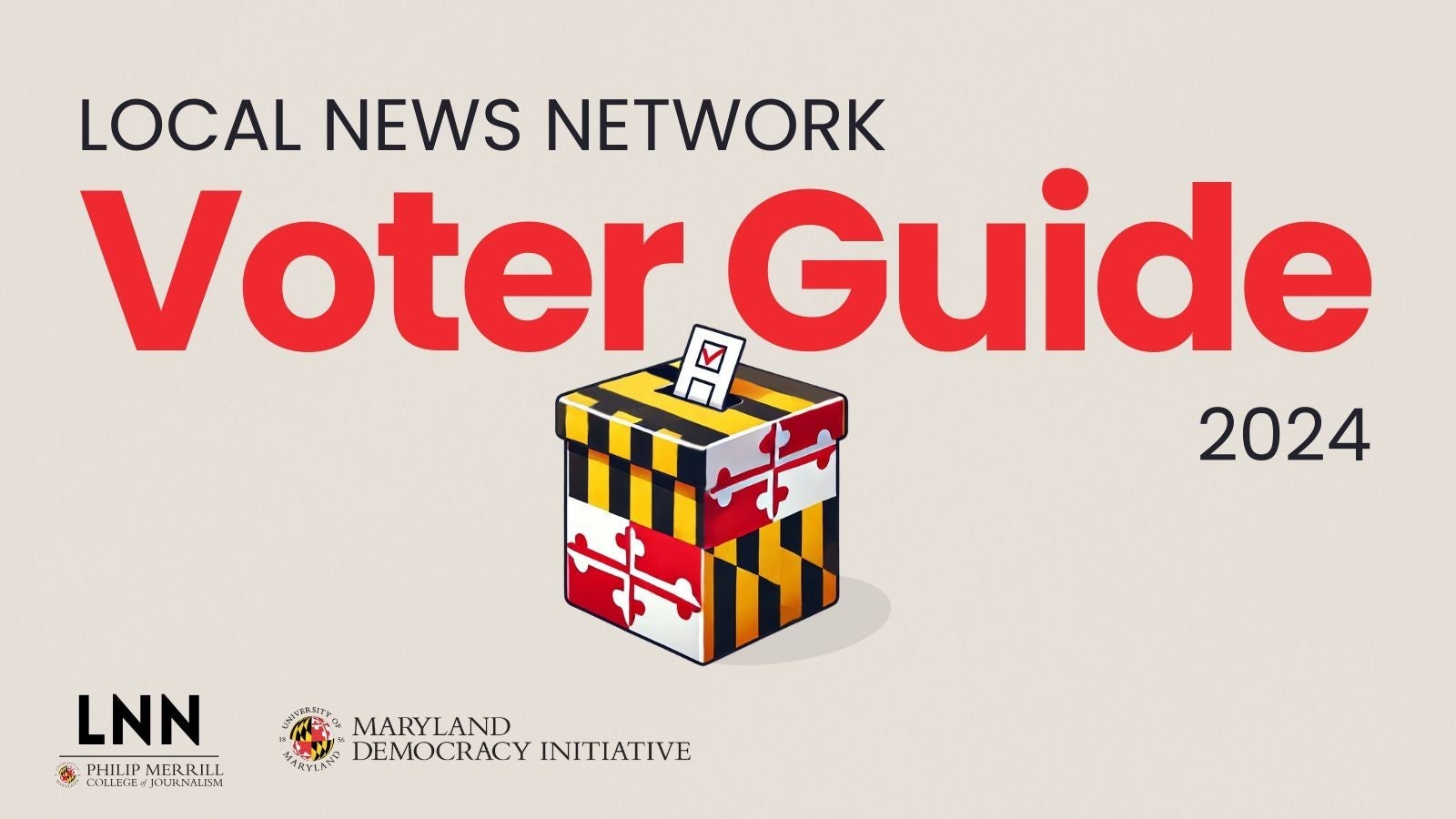
COLLEGE PARK — With Maryland’s early voting period opening Oct. 24, the Philip Merrill College of Journalism’s Local News Network on Monday unveiled its 2024 voter guide for every school board election in the state.
The University of Maryland’s Local News Network (@LNNMaryland on Twitter/X) — in partnership with Capital News Service and the university’s Maryland Democracy Initiative — surveyed all 109 candidates, 74 of whom responded.
All candidate Q&As, organized by Maryland county, can be found on the CNS website. LNN also published five stories on CNS, Merrill College’s student-powered news outlet, diving deeper into key findings revealed by the survey responses — including opinions about the Blueprint for Maryland’s Future, book banning, cellphones in schools, school safety and more.
“Through our school board voting guide, the Local News Network provides citizens throughout Maryland with information they need to make decisions about an issue of utmost importance: their children’s education,” Zremski said. “Tens of thousands of Marylanders used our voter guide two years ago, and we’re hoping this year’s guide is just as helpful.”
Information from the voter guide will be made available for publication free of charge to any news outlet in Maryland. For more information, contact Zremski at jzremski@umd.edu.
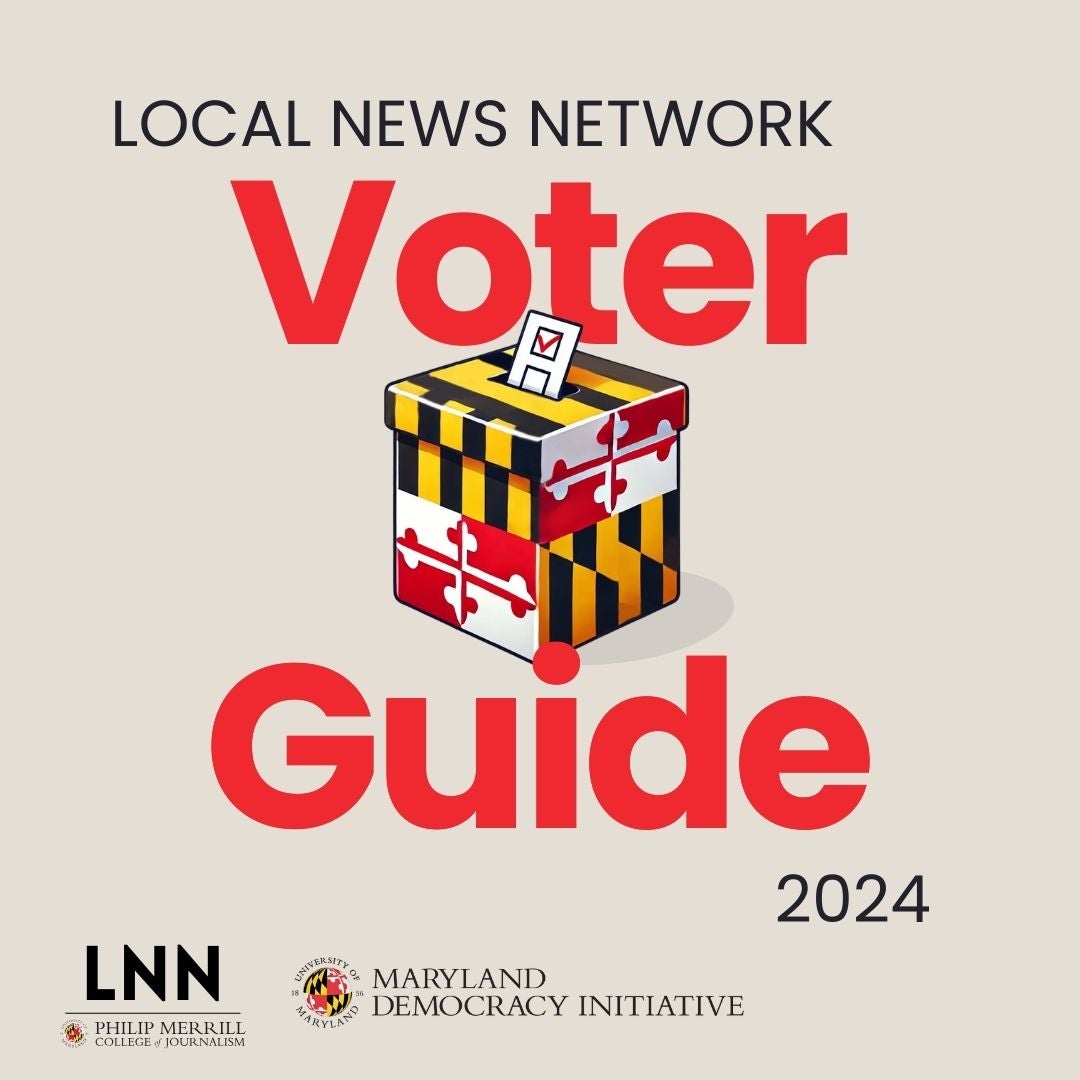
“An informed public is critical to a healthy democracy, and today’s overtaxed newsrooms can’t possibly cover every issue of interest to voters. In just a few short years, LNN has not only helped close that gap but our students and faculty have provided innovative tools and data that newsrooms in the state can use to make their journalism better,” said Merrill College Dean Rafael Lorente. “Our students, our school and our state are better because of LNN.”
The guide and stories were produced by a team of 105 student journalists and 10 Merrill College faculty members. Student journalists also did background checks on all the candidates. A future Capital News Service story will include details about candidates who have faced significant legal issues.
Key findings from the project:
- Asked in an open-ended question to name the most important issue facing their school board, the largest number of candidates — 27 — cited academic issues such as poor test scores or pandemic-related learning loss. Other top issues were student behavior/mental health (18 candidates), funding (16 candidates) and staffing (10 candidates).
- Asked about their views of the Blueprint for Maryland's Future, 55 candidates offered at least some praise for the state's massive 10-year education reform plan. But 42 of the candidates raised concerns about the program's costs and/or the mandates it imposes.
- Asked if they were satisfied with school safety, 48 candidates said they were not, while 21 said they were and five did not provide a conclusive answer. Twenty-five of the 74 called for increased access to mental health services for students, and 13 candidates called for tougher disciplinary measures.
- Of the 74 candidates who responded, 64 favored strong restrictions on cellphones in schools, and only 10 expressed reservations about tough cellphone policies or touted the positive aspects of phones in the classroom.
- Asked for their opinion on book bans, 38 candidates said they favored policies in which professionals review books to make sure they are age-appropriate. Another 19 strongly opposed book bans without citing existing policies for reviewing books. However, 17 candidates appeared open to banning books that parents find objectionable.
- Asked if schools should allow gender-nonconforming students to use their chosen pronouns without the school telling their parents, 29 candidates said yes while 32 said parents should be informed. Thirteen candidates either refused to answer the question or provided an answer that did not make their views clear.
School board voter guide stories:
Is Maryland's 'Blueprint' the path to better schools? We asked school board candidates
On school safety, Maryland school board candidates push for better mental health services
Should Maryland schools ban cellphones? Here's what school board candidates say
Support for book bans vary among Maryland school board candidates
On gender identity in schools, Maryland school board candidates are divided
About the Local News Network
The Local News Network was established by an anchor commitment from the Andy and Julie Klingenstein Family Fund. The network includes a local news collaborative and an internship program.
The local news collaborative teams Merrill College with news media in Maryland, providing experience for students through a midlevel reporting and writing class focused on local beat reporting while offering supplemental reporting for news organizations in Maryland.
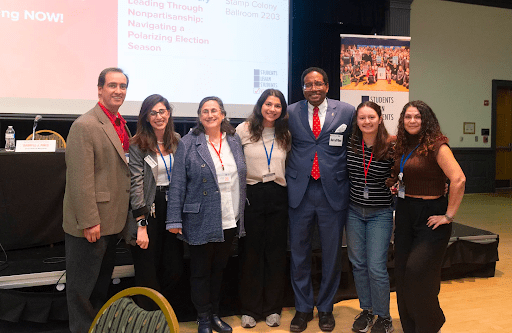
Funds will support MDI’s efforts to mobilize colleges and schools to welcome all new voters
With a critical election approaching this fall, a gift from Marsha and Henry Laufer (pictured below with President Pines) will accelerate efforts across the University of Maryland to strengthen democracy. The gift will support the work of the Maryland Democracy Initiative (MDI), an interdisciplinary effort that weaves together expertise from the College of Behavioral and Social Sciences, the College of Education, the Philip Merrill College of Journalism, and the School of Public Policy to generate novel approaches to grand challenges facing our democracy.
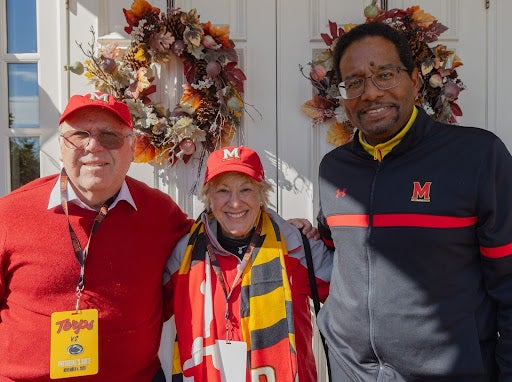
MDI has made significant progress toward this mission by focusing on the grand challenge of mobilizing colleges and schools to welcome all new voters. All across the world, data shows new voters participating at lower rates than voters who have been participating for many years. This problem is particularly acute in the United States, where the disparity in participation rates between younger and older voters is especially large. According to Resliancy Research being done in the College of Behavioral and Social Sciences at UMD, this failure to include new voters weakens our society and leaves democracies across the world less resilient in the face of growing long-term threats. Both the K-12 and higher education systems offer extraordinary opportunities to welcome all new voters to our democracy. MDI weaves together expertise from across four UMD colleges and schools to address this challenge in original and unique ways.
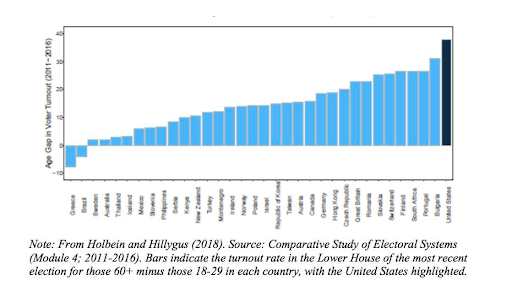
The gift from Marsha and Henry Laufer will dramatically accelerate UMD’s work in this area. The gift will support the Laufer Democracy Internship Program, a prestigious opportunity for 18 top UMD students to receive an entire summer of funding to work in some of the most impactful organizations in the nation working to strengthen voter mobilization and voter education in colleges and schools. This internship program is being developed in partnership with the Students Learn Students Vote Coalition, the nation’s strategy hub and largest non-partisan network dedicated to increasing college student voting rates. The Laufer Democracy Internship Program builds on MDI’s work in 2023, hosting the National Student Vote Summit at UMD and establishing the Student Vote Research Network to generate more useful knowledge for this field. Students participating in the Laufer Democracy Internship Program will get a unique opportunity to both pursue professional development at their placement and work with MDI faculty to pursue groundbreaking research into the most effective strategies for mobilizing student voters. The program further establishes UMD as a crucially important convener and research hub for efforts to mobilize colleges and schools to welcome all new voters.
"The Students Learn Students Vote Coalition couldn't be more excited to continue our strong partnership with the Maryland Democracy Initiative by supporting the placement of University of Maryland students with internships at nonpartisan organizations working to strengthen our democracy," said SLSV Co-Founder & Executive Director Clarissa Unger. "Marsha and Henry Laufer's visionary gift is an example for all alumni seeking to support their alma maters in ways that not only benefit the university but also benefit their students and our democracy."
The Laufer gift also supports the growth of a new research network that MDI faculty and fellows are establishing to generate knowledge about efforts to mobilize high schools to welcome new voters to our democracy. MDI faculty are using the gift to host the first in-person convening of the network, planned for June. This convening will be the first time that many of the nation’s most innovative organizations working to welcome new voters through high schools have met to establish a shared agenda for the field. MDI will also use the funding to support several important interdisciplinary research projects that weave together political science, education, policy, and journalism expertise to better understand how to seize unique opportunities associated with using schools as sites for non-partisan voter education and mobilization.
“2024 is going to be a crucial year for American democracy. Through the Maryland Democracy Initiative, the University of Maryland is uniquely positioned to meet the moment by activating its extraordinary talent, knowledge, and convening power, said Mike Hanmer, co-principal investigator for MDI. “This gift from Marsha and Henry Laufer will accelerate and strengthen that work at a crucial and strategic moment for our University and our democracy.”
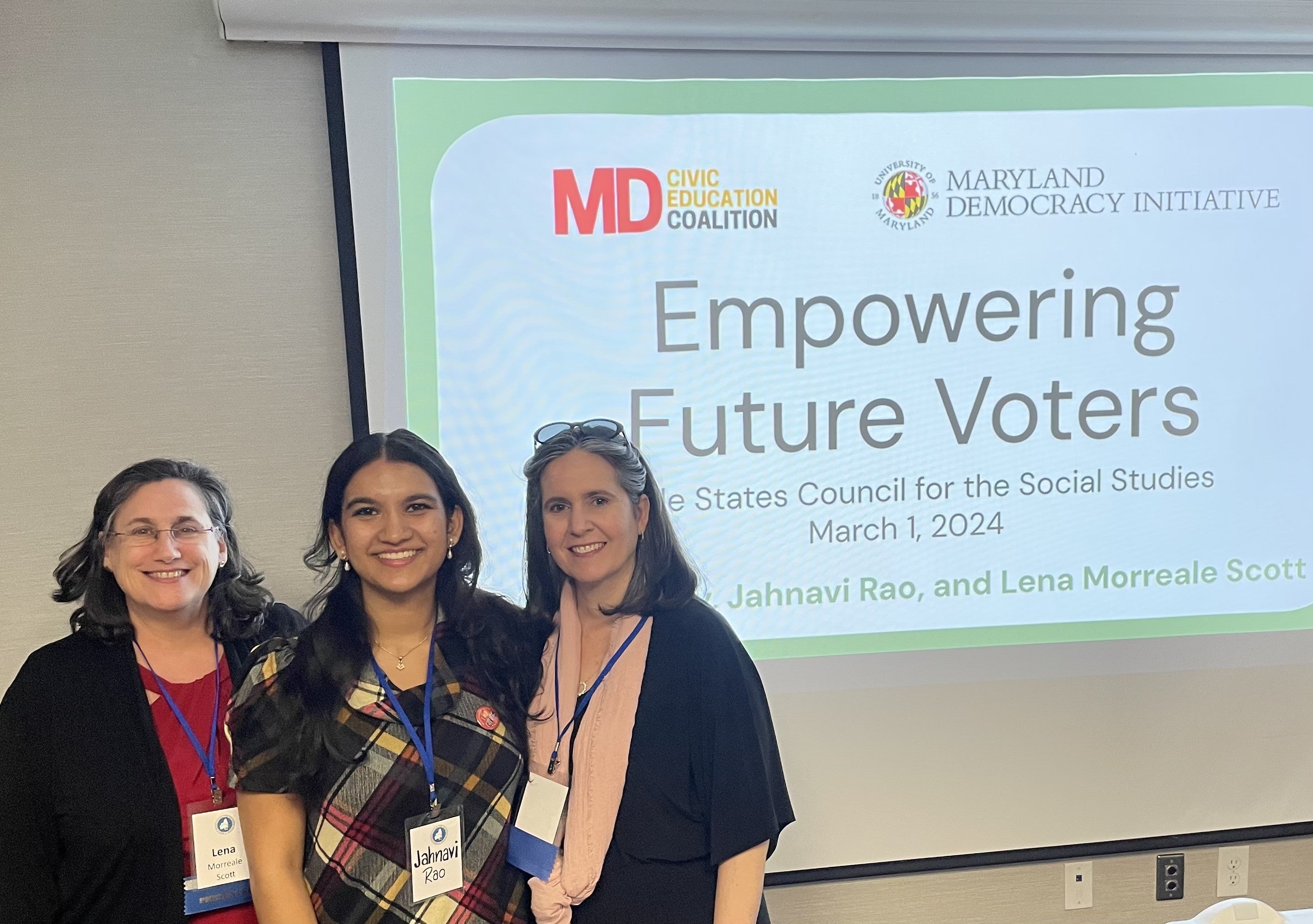
In March, Annapolis hosted the 2024 convention for the oldest social studies council in America—the Middle States Council for Social Studies. MDI’s lead Principal Investigator, Lena Morreale Scott, along with her colleague, Genie Massey from the Maryland Civic Education Coalition, and President & Founder of New Voters, Jahnavi Rao, presented their workshop, Empowering Future Voters.
The session, Empowering Future Voters, was presented to current and pre-service K-12 Social Studies educators from Delaware, Maryland, New Jersey, New York, Pennsylvania and Washington, D.C. The presenters introduced nonpartisan teaching materials from partners of the Maryland Civic Education Coalition and led participants through a discussion about strategies for incorporating the topics of voting and elections into elementary-, middle- and high school courses and extra-curricular activities. The presenters also shared resources and ideas for teachers to leverage community partnerships for enriching civic experiences like student-led, nonpartisan voter registration initiatives.
“As a high school teacher, curriculum writer and professional development specialist at a nonprofit civic education organization, and now on faculty here in our College of Education, I know it can be challenging to stay current about the high-impact practices that best support teaching civic content and skills,” said Scott. “I also know that teaching civics should not be siloed in one content area or for one age group. MDI believes teachers have a vital role in inspiring and preparing their students to make informed decisions, to become advocates for their communities, and to participate in our shared democracy.”
Teaching and learning are vital components of MDI’s mission to grow the capacity of all people for a lifetime of civic participation. Designing and providing materials and professional development for educators of students from pre-K through higher education supports their capacity to teach their students the content and skills necessary to become informed and active participants in our democracy.
The Empowering Future Voters presentation is one of the many ways MDI and its partners are working to strengthen teaching for civic engagement, a central pillar of MDI’s work.
Learn more about MDI’s Teaching and Learning pillar.
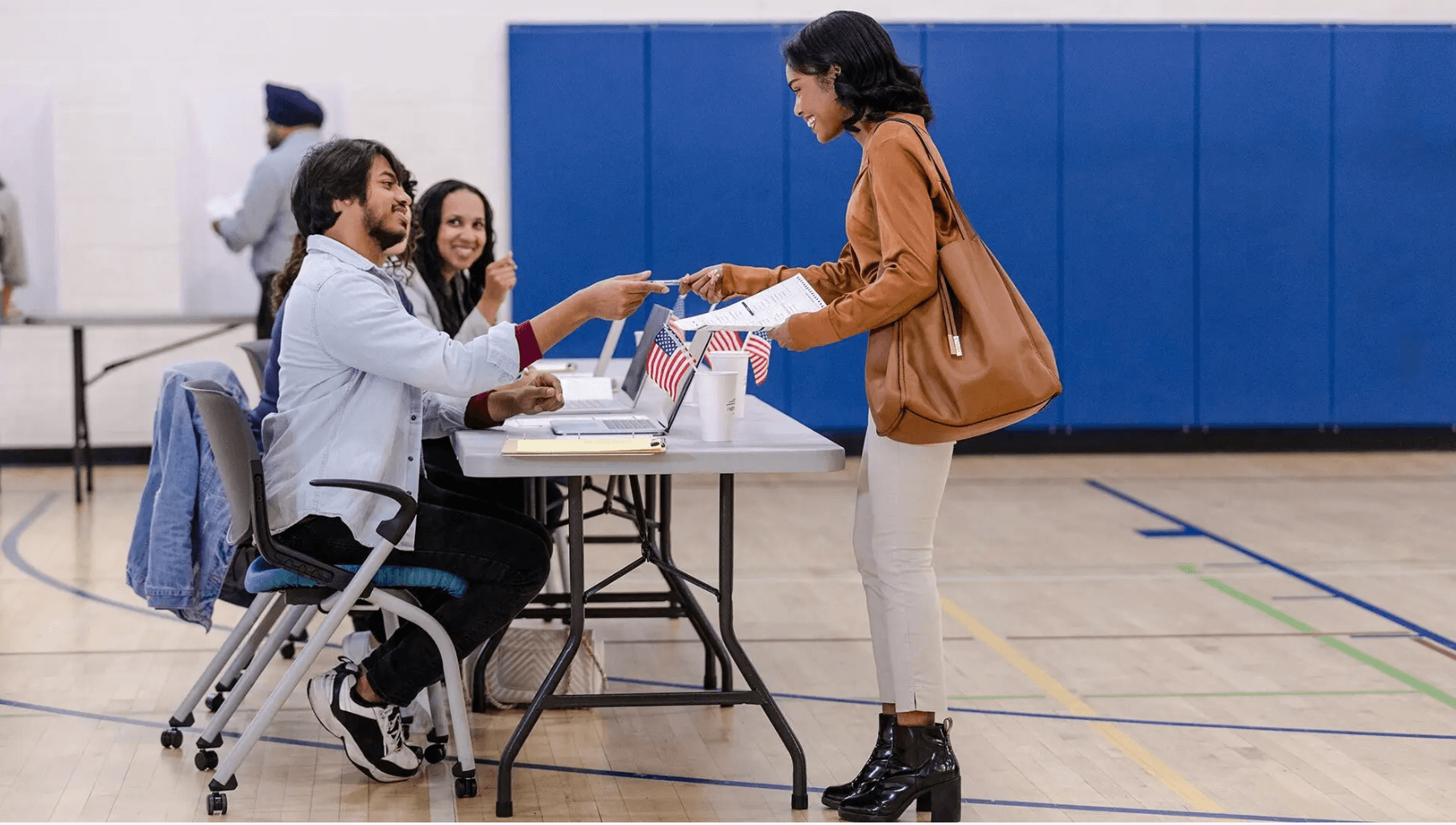
Federal Grant to Fund Resource Hub for Recruitment, Training
The University of Maryland will develop training for student poll workers from all University System of Maryland campuses, funded by a new grant from the U.S. Election Assistance Commission.
UMD will receive the bulk of the $78,521 grant announced on Friday to help each USM institution bolster civic engagement among young voters in the November 2024 election.
The Civic Innovation Center (CivIC) in UMD’s School of Public Policy will work with the Office of Leadership and Community Learning (LCSL) to establish a robust resource hub, which will be disseminated to all USM universities to provide the training and to help connect trained student poll workers with counties in Maryland that may require additional support.
“Direct participation in our democratic system, particularly at a younger age, builds habits of engagement that last a lifetime,” said CivIC Director Paul Brown. “The future is now in terms of the need for, and ability of, students to serve as poll workers.”
Despite the record turnout in the 2020 presidential election, the number of poll workers was stagnant, according to a 2020 report from the EAC. It found that 6.2% of poll workers were ages 18-25, up from 4.5% in 2016, but still far short of the potential that college students, as a demographic group, hold to meet the demand for poll workers.
“By serving as poll workers, college students are helping make polling locations more representative and equitable,” said Courtney Holder, assistant director of the Adele H. Stamp Student Union who leads the LCSL. “When locations are fully staffed with sufficient numbers of poll workers, voters are less likely to experience long lines, be unjustly turned away or risk losing their polling location in an underserved community.”
She added that engaging as poll workers gives college students the opportunity to witness firsthand the intricacies of the voting process, understand voting security measures and actively contribute to ensuring the fairness and integrity of elections.
Collaborating with the Maryland State Board of Elections, UMD will create recruitment and training modules to equip students with the skills and knowledge needed to serve effectively as election poll workers. All USM universities will host recruiting events to attract participants.
UMD will also incorporate into the training targeted strategies such as multilingual messaging, partnerships with campus multicultural offices, collaboration with career services and support from faculty and administrators to ensure broad participation from diverse student populations. Each USM campus will have the opportunity to get a mini-grant and create a plan for the strategies they want to adopt.
Brown, also a co-principal investigator in the Maryland Democracy Initiative, envisions ways that the recruitment and training best practices associated with the grant might be adapted to younger students in high school. “MDI supports civic engagement at all stages of life, but building a solid foundation in the early years of education is critical. MDI’s work with the Maryland Civic Education Coalition and the Vote 16 Research Network will be a great avenue for bringing direct participation opportunities, such as serving as a poll worker, into the experience of high school students in Maryland.”
“Educating for democracy has been at the center of the USM mission from its beginning,” said Nancy Shapiro, USM associate vice chancellor for education and outreach. “We want our students to be fully prepared to contribute to the civic health of their communities and understand their responsibilities to preserve and protect our democracy.”
Adapted from a story that first appeared in Maryland Today.
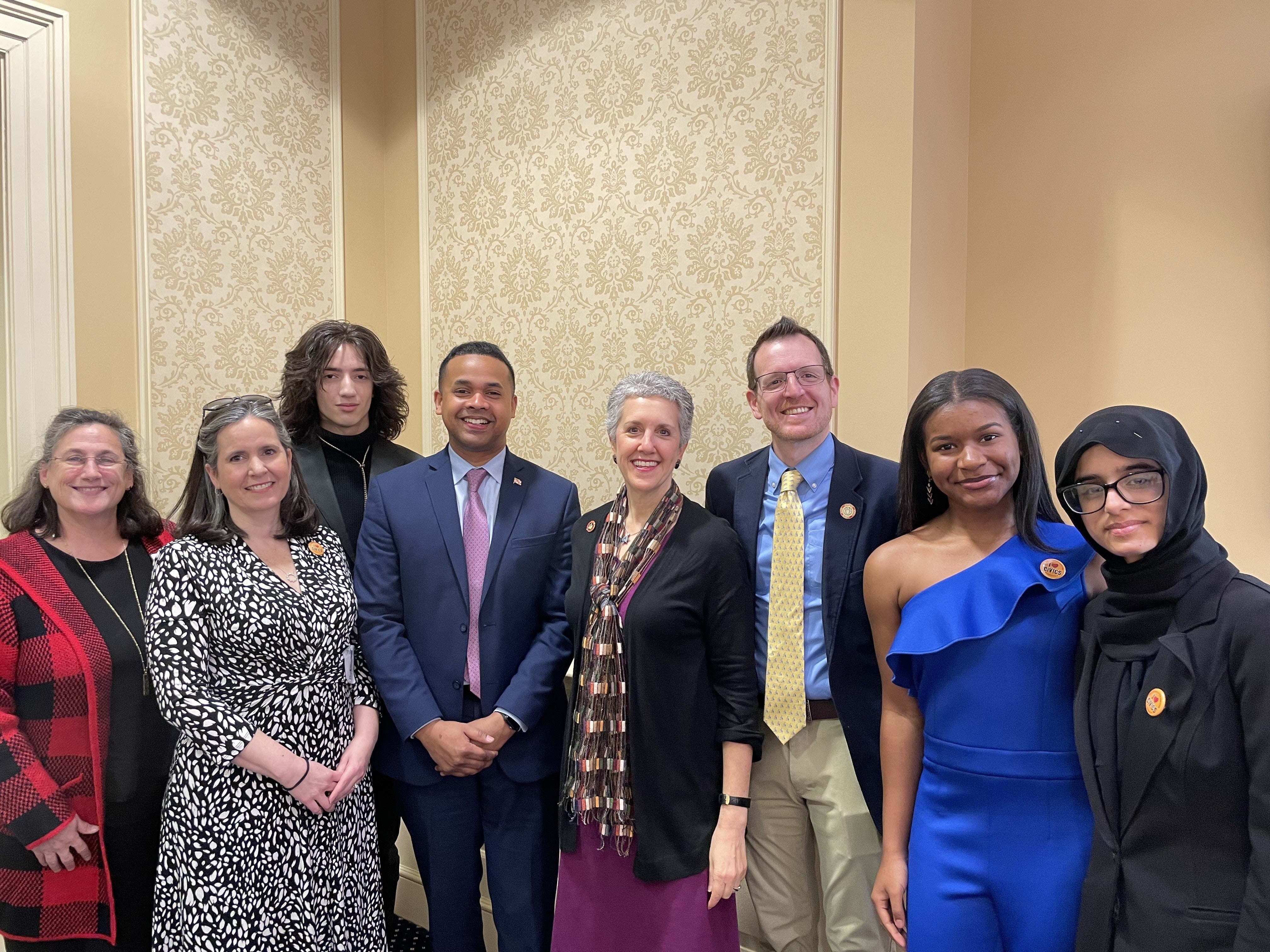
Lena Morreale Scott, MDI lead Principal Investigator and Co-chair of the Maryland Civic Education Coalition (MDCEC), joined MDCEC colleagues and youth advisory council members Meerub Malik, Alex Hossainkhail and Kinsley Potts, as well as Maryland Department of Service and Civic Innovation Secretary Paul Monteiro, to testify in the Maryland General Assembly on behalf of SB 762: Maryland Civic Excellence Program. SB 762 would establish a voluntary program where school systems can recognize students and public schools for their civic readiness and engagement efforts. Senator Cheryl Kegan (D-District 17) and Senator Justin Ready (R-District 5) have sponsored the bill in the MGA Senate with bipartisan support. With the 2024 MGA session ending on April 8, SB 762 has successfully advanced out of the Education, Energy and Environment (EEE) committee and out of the Senate and is currently under consideration in the House of Delegates.
By incentivizing and celebrating students who are exceptionally knowledgeable, prepared, and civically engaged and recognizing the public institutions that support them, SB 762 will strengthen meaningful, equitable, and high-quality civic education in Maryland public schools, a fundamental aspect of strengthening our shared democracy.
According to surveys conducted and test scores, Americans’ civic knowledge is low and many people lack essential civic skills such as dialogue, consensus-building, and information/media literacy. Additionally, polls continue to show us that Americans are losing confidence in their ability to make a difference in their democracy. We also know that students who participate in high-quality civics are equipped with the knowledge, skills, and experiences to participate more successfully and they have the agency necessary to believe their participation matters.
As the Moore Administration’s Department of Service and Civic Innovation moves into its second year, Scott believes that SB762 has the power to amplify many of the priorities associated with this new department. “Through the Maryland Civic Excellence Program, we can catalyze students’ positive experiences with service-learning to prepare and inspire young people to life-long service and civic engagement,” Scott said in her recent testimony to the MGA’s EEE committee.
With the passage of SB 762 and the creation of the Civic Excellence Program, Maryland can reverse an alarming trend that has marginalized the teaching of Social Studies to emphasize reading and math scores at the expense of other competencies, like civic competency. For example, federal spending per pupil spending on civic education is 50 cents compared to $50 on STEM education. The Maryland Civic Excellence Program would give educators the opportunity and incentive to rededicate attention to teaching for civic engagement while empowering each local school system to develop its own criteria for awarding students and schools with a Civic Excellence Seal.
The University of Maryland and its many partners in the Civic Education Coalition and the Maryland State Department of Education have opportunities to collaborate to support district leaders in developing their programs in ways that are measurable, impactful, and equitable and assist school leaders with resources to support teacher professional development and innovation.
“We would like to see future programs include opportunities for students to be celebrated for participating in civic-themed extra-curricular activities and elective courses from all content areas, not just Social Studies,” said Scott. “We are simply enthusiastic about what may be possible in the future. We stand ready to support the program’s success.”
Scott believes, “the Maryland Civic Excellence Program strengthens the civic mission of our schools and our democracy’s foundation. It supports building our shared democracy together with teaching and learning that celebrates and elevates life-long service and civic participation.”
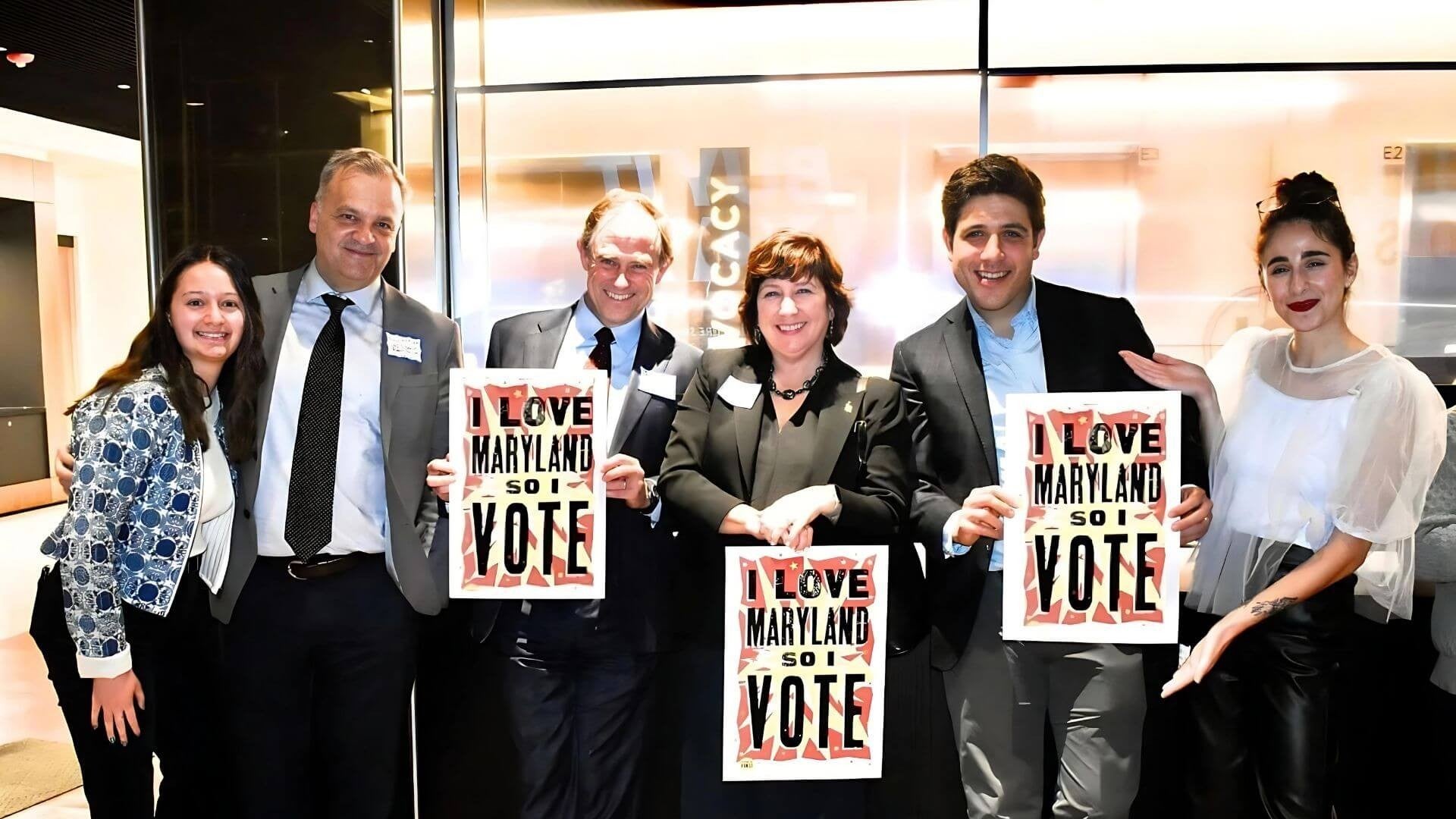
November 30, 2023
Young voters are expected to turn out in record numbers in 2024, injecting fresh perspectives, diverse voices and a keen awareness of contemporary issues into what’s expected to be a contentious election. The question of how to encourage and harness the power of those young people was a primary issue at the National Student Vote Summit, which took place at the University of Maryland. Hosted by the Students Learn Students Vote Coalition (SLSV), in collaboration with the Maryland Democracy Initiative (MDI) and TerpsVote, it was the first in-person summit since 2019 and attracted hundreds of students, staff and university leaders from 65 colleges and universities, 62 nonprofit organizations and three election offices representing 25 U.S. states and D.C.
“UMD has a proven track record of leadership with regard to supporting student voting. Co-hosting the National Student Voting Summit with TerpsVote and SLSV was a great way to showcase the incredible work going on across campus and to engage other leaders in this space,” said Michael Hanmer, an MDI principal and Center for Democracy and Civic Engagement director.

November 14, 2023
The University of Maryland and the city of College Park have long been interdependent. They collaborate frequently on public projects, including student housing and the Purple Line. However, many students at the University don’t interact significantly with the government of College Park despite living in the city most of the year. Collaborations across UMD have been working to facilitate more interaction and strengthen the relationship between UMD students and the city of College Park. Two recent events co-sponsored by the Maryland Democracy Initiative and its civic partners are the most recent examples.
Thurgood Marshall Hall was the site for a candidate town hall on October 30 in which eight candidates for various city council districts and the current mayor of College Park, Fazul Kabir, came together to answer questions submitted by students and other constituents. The event, organized entirely by students, took place in advance of the November city council and special mayoral elections. The town hall was a collaboration between several campus partners, including the University Honors class on democratic habits, the student liaisons to the city council, the UMD Student Government Association, the UMD Department of Communications, the Civic Innovation Center, and the Maryland Democracy Initiative.
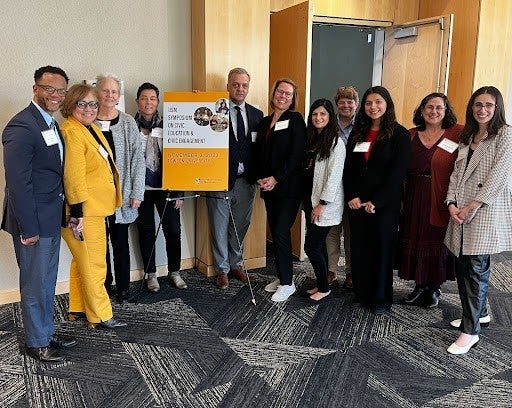
October 22, 2023
Maryland is a nationally recognized leader in efforts to promote better civic and service learning outcomes for students in preschool through higher education. Two members of the Maryland Democracy Initiative (MDI) team actively worked to build and strengthen that leadership in recent national and state civic conferences.
Lena Morreale Scott and Paul Brown attended Democracy360, a late-October democracy and civic engagement conference hosted by the Karsh Institute of Democracy at the University of Virginia. They were invited to represent Maryland by Civic Learning for an Engaged Democracy (CLDE), a national coalition of education and policy organizations committed to making college students’ civic learning for an engaged democracy a priority across higher education and in public policy.
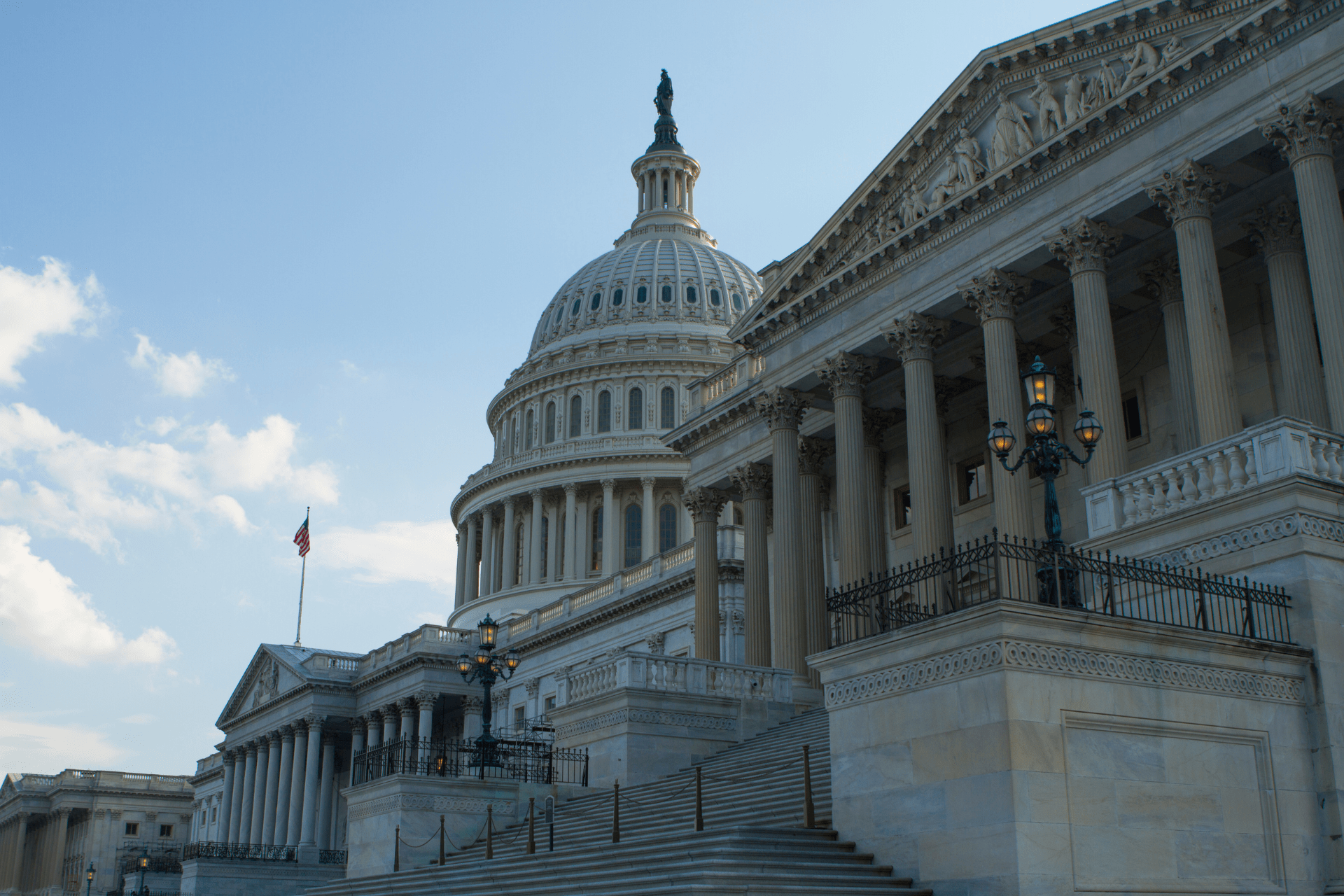
October 9, 2023
It’s one thing to argue passionately for a cause you believe in, but what if you had to bring your best arguments to support a position that you otherwise strongly oppose? On Friday, October 6, students from across the Big Ten joined together for a policy simulation where many faced that dilemma. They stepped into the roles of current U.S. senators in a policy simulation hosted by the Big Ten Collaboration: Democracy in the 21st Century, a conference-wide partnership providing educational programming that promotes active civic education and engagement.
Forty students from campuses across the Big Ten were assigned to simulate different U.S. Senate Judiciary Committee members debating the Democracy Restoration Act, legislation sponsored by Senator Ben Cardin (D-MD) to secure voting rights for previously incarcerated persons. The simulation was designed and facilitated by University of Michigan Professor Elisabeth Gerber, using the ViewPoint simulation software platform.
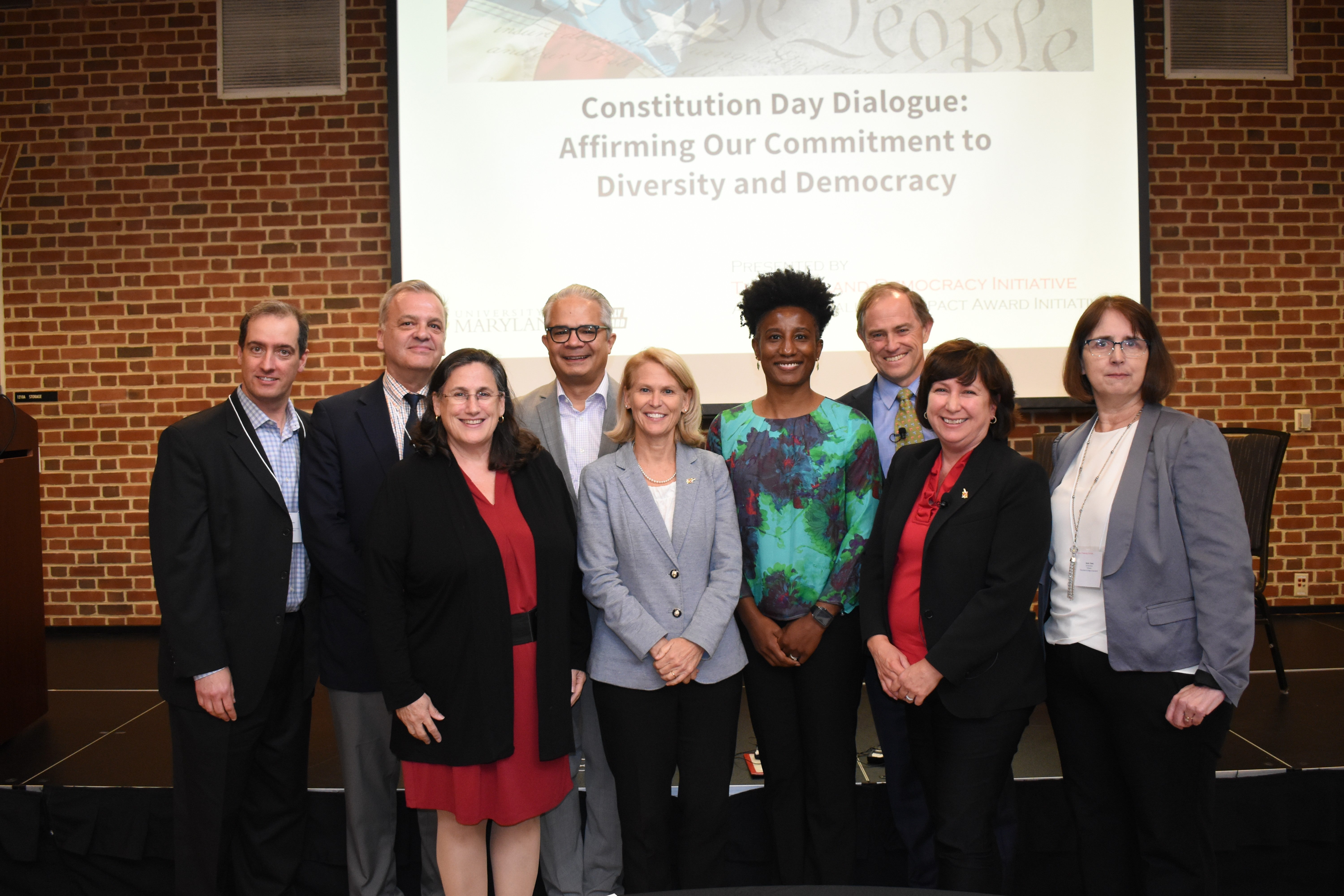
September 20, 2023
On Monday, the Maryland Democracy Initiative (MDI), which is supported by a Grand Challenges Impact Award, hosted a Constitution Day Dialogue event with a diverse panel of experts who gathered to discuss the pivotal role of education in shaping the future of democracy. The event, held at STAMP Student Union, addressed the implications of recent Supreme Court decisions involving race-based admissions in higher education and the broader challenges facing democracy today.
Among the speakers and panelists were Lena Morreale Scott, director of the Civic Education & Engagement Initiative in the College of Education and principal investigator for the MDI; Janelle Wong, director of Asian American Studies and professor of American Studies and Government and Politics in the College of Behavioral and Social Sciences; Kimberly Griffin, dean and professor of the College of Education; Rafael Lorente, dean and professor of the practice in the Philip Merrill College of Journalism; Robert C. Orr, dean of the School of Public Policy; and Susan Rivera, dean of the College of Behavioral and Social Sciences. The panel discussion was moderated by Senior Vice President and Provost of the University of Maryland, Jennifer King Rice.

